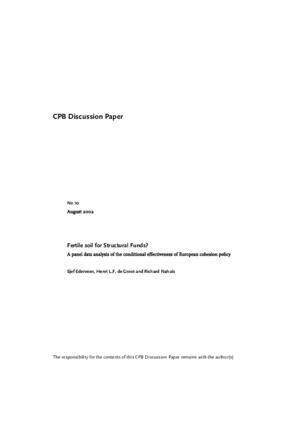August 1, 2002
Fertile soil for structural funds? A panel data analysis of the conditional effectiveness of European cohesion policy
Structuurfondsen Europese Unie grotendeels ineffectief door gebrekkige instituties
Press release
De Structuurfondsen van de EU zijn gemiddeld genomen niet effectief in het bevorderen van economische groei. Het is echter niet zo dat de structuurfondsen onverdeeld ineffectief zijn. Integendeel, structuurfondsen zijn wel effectief als ze in een land worden ingezet waar de kwaliteit van de instituties van voldoende hoog niveau is.
We are sorry, unfortunately there is no English translation of this page.
Structural funds are the most intensively used policy instrument by the European Union to promote economic growth in its member states and to speed up the process of convergence.
This paper empirically explores the effectiveness of European Structural Funds by means of a panel data analysis for 13 countries in the European Union. We show that - on average - Structural Funds are ineffective. For countries with the ‘right' institutions, however, Structural Funds are effective. The latter result is obtained for a wide range of conditioning variables, such as openness, institutional quality, corruption and indicators for good governance.
Authors
Sjef Ederveen
Henri de Groot
Richard Nahuis
